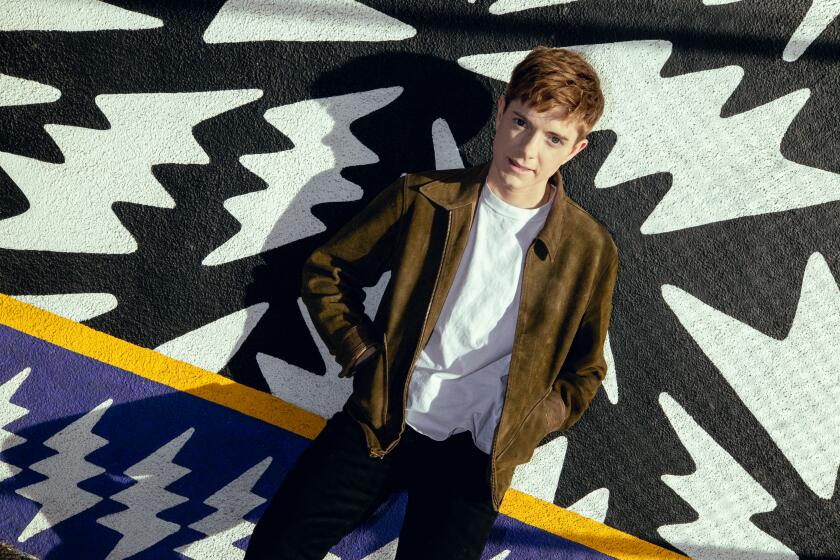Alumni to Re-Create Stan Kenton Sound
- Share via
Stan Kenton fans--unlike the followers of Duke Ellington, Count Basie, Woody Herman and others--don’t have the opportunity to hear ghost band versions of their favorite music. The Kenton estate, following his wishes, has not allowed an ensemble bearing his name and performing in his inimitable style to exist.
But individual Kenton events have been licensed by his widow, Audree Coke Kenton. And Saturday night at Occidental College’s Thorne Hall, the American Jazz Institute presents “The Kenton Sound,” a celebration of music covering the entire span of the Kenton Orchestra’s 37-year history, performed by alumni from each of the ensemble’s eras.
The timing is appropriate on two counts. It is 20 years ago, almost to the week, since the Kenton band played its last engagement--on Aug. 20, 1978. He died on Aug. 25 the following year, at 68, of complications resulting from a stroke.
“We’ve picked a cross section of things from the ‘40s through the ‘70s to do,” says Mark Masters, who organized the program. “There’ll be a few chestnuts like ‘Intermission Riff,’ ‘Love for Sale’ and ‘Peanut Vendor’ that were in the book for years and that everybody expects to hear. And we’ll also do some things that were written for the band but never recorded, like a piece by Bob Graettinger.”
That should be especially interesting, since Graettinger’s pieces for Kenton, notably an extremely dissonant work titled “City of Glass,” were particularly complex and difficult to access. In comparison to the more jazz-oriented composer-arrangers who wrote for the orchestra--Bill Holman, Gerry Mulligan, Bill Russo and Pete Rugolo (who will conduct several works at the concert) among them--Graettinger was a musical maverick, more closely associated with contemporary concert music than jazz.
According to Masters, “Graettinger once said about himself that he lived ‘above the timberline, where nothing grew.’ How’s that for being bleak? But it describes what he did to a T.”
Humorist Mort Sahl, commenting on the dissonance of Kenton’s more adventurous music, noted whimsically that at one of the orchestra’s dance gigs, “a waiter dropped a tray and three couples got up to dance.”
Perhaps more to the point, the wide selection of material planned for the tribute underscores Masters’ contention that “the Kenton band wasn’t really a jazz player’s band; it was a writer’s band. Stan would let the guys write whatever they wanted to do. Look at it this way: Stan was rooted in early jazz, yet he was willing to let people like Bill Russo, Gerry Mulligan and Bill Holman take over and do their charts the way they wanted to. I think that was a real testimony to his musical open-mindedness.”
The concert begins at 8 p.m. with a brief presentation in which some former Kenton musicians and associates will reminisce and answer questions about the band.
* Occidental College’s Thorne Hall, 1600 Campus Road, Los Angeles. Tickets are $25 and $40. Ticket information: (626) 798-3127.
On Record: Blue Note has released six more titles in its continuing limited-edition series of Pacific Jazz recordings. Three trace to the “cool” style generally associated with West Coast jazz in the ‘50s: Gerry Mulligan’s “Original Quartet With Chet Baker,” Bob Brookmeyer’s “Traditionalism Revisited” and Bud Shank and Bob Cooper’s “Blowin’ Country.” The balance includes some early ‘60s sessions still powerfully influenced by blues, soul and R&B; energies from the Central Avenue jazz scene: Teddy Edwards’ “Sunset Eyes,” Earl Anderza’s “Outa Sight” and Curtis Amy and Dupree Bolton’s “Katanga.” Except for the Mulligan disc, all include unreleased bonus tracks and have previously been unavailable in the U.S. since their original release as LPs or 78 rpm singles.
Vocal Time: Singer Tierney Sutton is the sole West Coast representative among the 11 semifinalists in the Thelonious Monk International Jazz Vocals Competition. There were more than 300 entries in the competition, including singers from Australia, Italy and the United States. Sutton, who heads the vocal jazz department at the University of Southern California, will participate in the semifinal competition Sept. 24 at Washington, D.C.’s Blues Alley Club. Judges for the event include Dee Dee Bridgewater, Diana Krall and Joe Williams.
Jazz Aid: Betty O’Hara, 73, is a veteran jazz artist whose trombone playing and singing have entertained Southland audiences for years. She recently suffered a devastating stroke and is now in a rehabilitation center in Sherman Oaks, receiving ‘round-the-clock care. Her many friends have created a fund to aid O’Hara’s continuing treatment. Donations are tax-deductible, with all of the funds going directly to cover her numerous expenses. Information: (818) 784-9642 or (805) 583-3886.
Riffs: On Monday, San Francisco’s Madeline Eastman, one of the most underappreciated jazz singers in the country, makes a rare one-night appearance at Catalina Bar & Grill. Just back from a four-week tour of Europe during which she did a jazz residency in Glasgow, Scotland, Eastman returns to Europe in October to record in Amsterdam with pianist Kenny Barron and the Metropole Orchestra. . . . On Wednesday, Joe Bushkin, the 81-year-old pianist, begins an equally rare five-night run at the Jazz Bakery with guitarist Howard Alden (41 years his junior). Bushkin, who recorded with Billie Holiday in 1936 and performed with the orchestras of Bunny Berigan, Tommy Dorsey and Benny Goodman, is also the composer of “Oh Look at Me Now” and the wartime anthem “There’ll Be a Hot Time in the Old Town of Berlin.”
More to Read
The biggest entertainment stories
Get our big stories about Hollywood, film, television, music, arts, culture and more right in your inbox as soon as they publish.
You may occasionally receive promotional content from the Los Angeles Times.










